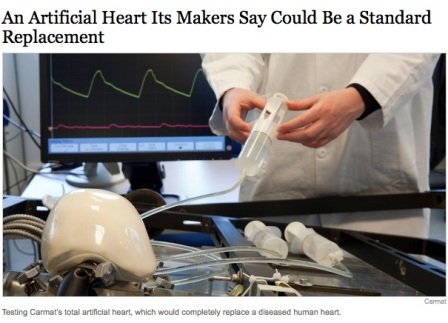July 14th, 2010 by GarySchwitzer in Better Health Network, Health Policy, News, Opinion, Research
No Comments »

Here we go again. And believe me, as one who’s covered the artificial heart experiments of the 1980s, I feel like I’ve been through this countless times before — but so have health news readers.
Another entrepeneurial team announces hopes for its artificial heart device and some news coverage trumpets the company’s announcement:


But this was in The New York Times! Now, granted — it’s in a “Global Business” section. But we don’t see why that removes the need for more scrutiny, for independent perspective, and for a better discussion of evidence. Read more »
*This blog post was originally published at Gary Schwitzer's HealthNewsReview Blog*
July 13th, 2010 by RyanDuBosar in Better Health Network, Health Policy, News, Research
No Comments »

Heart attack mortality fell by nearly a half a percent last year at 4,500 hospitals that treat Medicare patients. And, facilities with the lowest and highest death rates saw similar declines, according to a new hospital report card by the U.S. Centers for Medicare and Medicaid Services (CMS).
Heart attack mortality fell from a national average of 16.6 percent last year to 16.2 percent, with a range among all facilities from 14.5 percent to 17.9 percent. CMS released the data as part of its hospital report card effort to spur better quality and outcomes through public reporting of recommended treatments. The agency added heart attack and heart failure mortality to the report card three years ago.
At issue now is what’s driving the figures: public reporting of hospital data driving improvement, or faster door-to-balloon-treatment times. Areas that do need to improve include lowering readmissions and getting people to the hospital faster when they have a heart attack. (USA Today)

*This blog post was originally published at ACP Hospitalist*
July 7th, 2010 by DrWes in Better Health Network, Health Policy, Health Tips, Opinion, True Stories
No Comments »

Call it sweet, delicious vindication. It was clinic day yesterday. No longer had I completed my rant in this blog about UnitedHealthcare’s program to require all cardiac elecrophysiologists to obtain a “notification number” before performing any pacemaker or defibrillator procedure, I discovered my letter from them dated June 3, 2010, on my desk stating that this requirement will begin September 1, 2010, for all Illinois electrophysiologists for “all electrophysiology procedures.”
Not longer than an hour later I was seeing a 67-year-old patient in the clinic who asked me: “I just got my Medicare (Part A) card and must decide about which insurer I should use for Part B, C, D, E, and F,” he said jokingly. “Since I have the medical problem and might need some care in the future, is there a company you would recommend?” Read more »
*This blog post was originally published at Dr. Wes*
July 5th, 2010 by KevinMD in Better Health Network, Health Policy, News, Opinion, Research
No Comments »

Emergency physicians are in a dilemma. Risk missing a diagnosis and be sued, or be criticized for overtesting.
Regular readers of this blog, along with many other physicians’ blogs, are familiar with the difficult choices facing doctors in the emergency department.
The Associated Press, continuing its excellent series on overtesting, discusses how lawsuit fears is a leading driver of unnecessary tests. Consider chest pain, one of the most common presenting symptoms in the ER:
Patients with suspected heart attacks often get the range of what the ER offers, from multiple blood tests that can quickly add up in cost, to X-rays and EKGs, to costly CT scans, which are becoming routine in some hospital ERs for diagnosing heart attacks …
… and the battery of testing may be paying off: A few decades ago insurance statistics showed that about 5 percent of heart attacks were missed in the emergency room. Now it’s well under 1 percent, said Dr. Robert Bitterman, head of the American College of Emergency Physicians’ medical-legal committee.
“But you still get sued if you miss them,” Bitterman added.
The American Medical Association’s idea of providing malpractice protection if doctors follow standardized, evidence-based guidelines makes sense in these cases. Furthermore, it can also help reduce the significant practice variation that health reformers continually focus on. Read more »
*This blog post was originally published at KevinMD.com*
June 29th, 2010 by DrWes in Better Health Network, Health Policy, News, Opinion, True Stories
No Comments »

As doctors increasingly become physician-employees, there’s no longer a need to share resources with university specialists:
Three University of Virginia cardiologists have been told by the Augusta Health board they will lose their hospital privileges next week, impacting the 2,500 patients the doctors serve.
Augusta Health officials [Crow] told the doctors in a letter that they won’t be able to treat their patients in emergencies or otherwise at the hospital in Fishersville. Crow’s statement said the board is limiting cardiology department participation to doctors “under contract to Augusta Health.”
Augusta Health has four cardiologists on staff, and will soon have a fifth, he said. Limiting cardiology participation to the hospital’s own doctors will allow Augusta Health “to build a strong and financially viable community-based cardiology program,” Crow said.
Universities have a long history of exporting their clinical expertise in the hopes of capturing more complicated surgical cases from their imbedded specialists. With more and more health systems consolidating (note the 3-for-1 swap above), the days of collaboration and shared resources between health systems are ending and patients are finding access to doctors more challenging.
-WesMusings of a cardiologist and cardiac electrophysiologist.
*This blog post was originally published at Dr. Wes*
![]()















